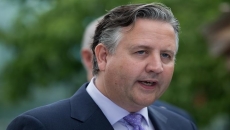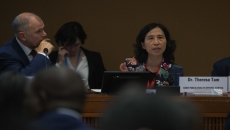Canada's federal and provincial governments will be watching closely for teachable moments as jurisdictions in the United States start to lift personal restrictions and reopen businesses in the wake of the COVID-19 pandemic, Prime Minister Justin Trudeau says. The best way forward will be informed by what works — and also what doesn't — as the U.S. and the rest of the world emerges from the crisis, Trudeau said Thursday during his daily briefing outside the front door of his Rideau Cottage residence.
All the while, he added, the mutual ban on non-essential travel between the two countries will remain.
"We have strong border measures in place to ensure that we're doing what we need to do to protect Canada," Trudeau said.
"As provinces look at their own situation and how we can move forward on beginning to reopen our economy, I know their decisions and our decisions will be informed by what is working, and what is perhaps not working as well, elsewhere the world."
In both countries, the process of restarting the economic engine is taking place on a state-by-state and province-by-province basis: P.E.I. is eyeing a gradual process beginning next week, while Saskatchewan and Quebec are also laying out timelines.
In the U.S., however, where a partisan spasm of frustration and desperation has sent residents and supporters of Donald Trump into the streets to demand they be allowed to go back to work, some states are already moving with breathtaking speed.
Georgia is planning to start throwing open its doors on Friday, a timeline that even the otherwise gung-ho U.S. president conceded Wednesday may be premature, given that the state has not reached the Phase 1 criteria of the multi-stage White House framework for lifting restrictions.
Trump, who has for weeks made it clear he wants the country back to work sooner rather than later, insisted the decision is Gov. Brian Kemp's to make.
Despite growing evidence that infection rates in the U.S. are slowing, public health officials have been urging a go-slow approach to ensure COVID-19 doesn't make a comeback and undo all the progress made so far.
That, Trudeau said, will be Canada's approach: a gradual lifting of restrictions that's informed by federal guidelines on when it's safe to do so.
"Different provinces are in very different postures related to COVID-19 and will be taking decisions that are appropriate for them," he said.
"What we're doing at the federal level is pulling together and attempting to co-ordinate all different provinces, so that we are working from a similar set of guidelines and principles to ensure that Canadians right across the country are being kept safe as we look to those next steps."





